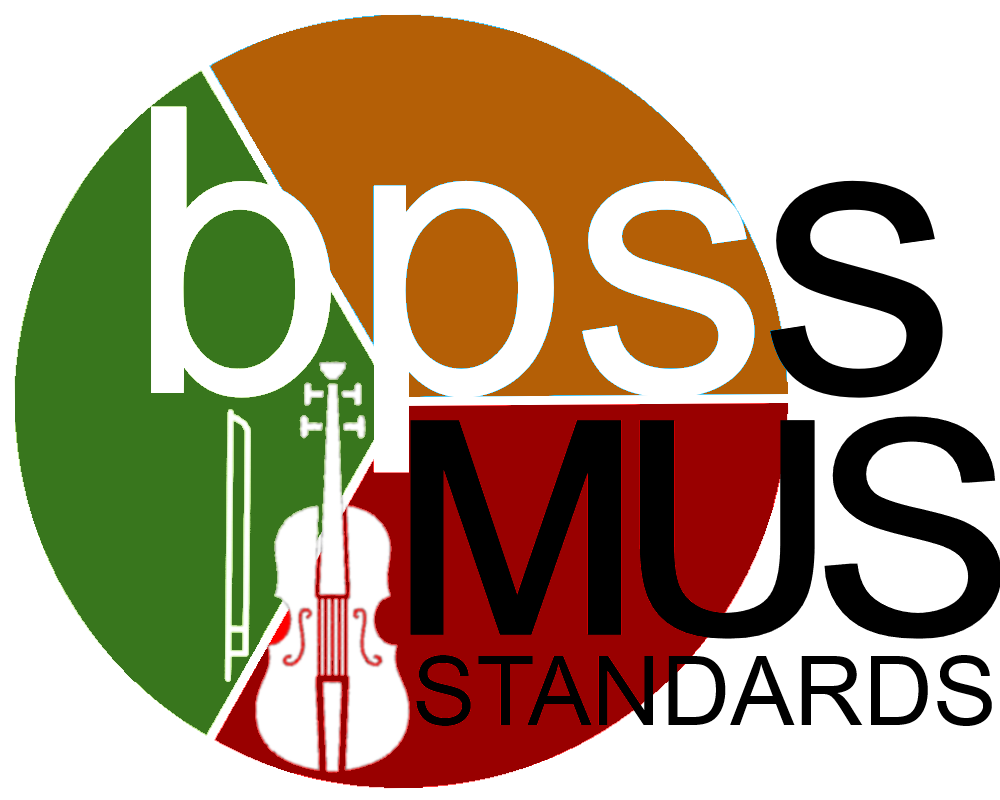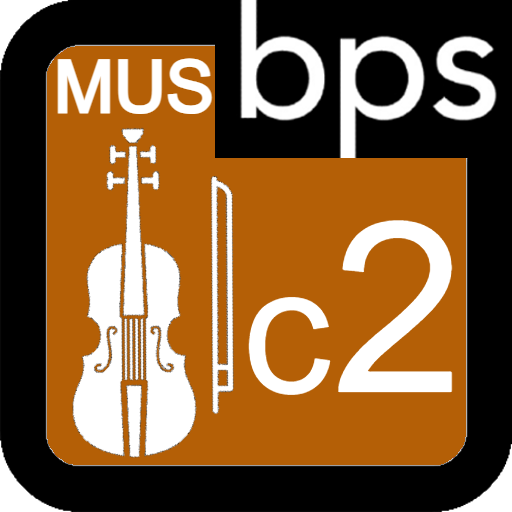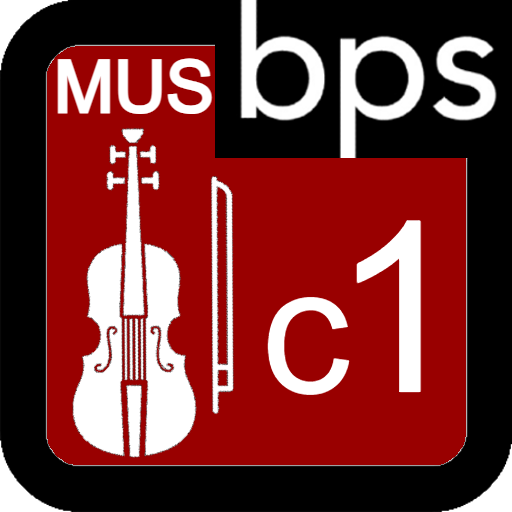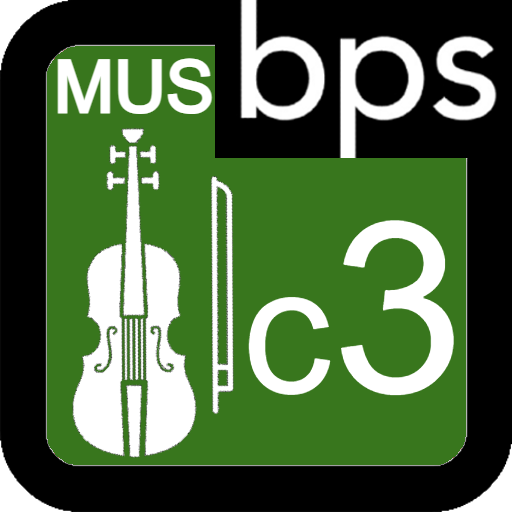MUS-06.c2  MUS-06.c2 MUS-06.c2 Category  | (c2) Category 2: Musicianship Skills and Knowledge
The elements such as understanding of rhythms, aural skills, note-reading skills, etc., that relate to musical understandings. |
MUS-06.c2.A
Tonal Aural Skills and Ear Training | MUS-06.c2.B
Rhythmic Aural Skills and Ear Training | MUS-06.c2.C
Creative Musicianship |
|---|
| Students demonstrate the following abilities: matching and manipulating pitch, playing with a sense of tonality, tonal-melodic and tonal-harmonic function (horizontal/vertical relationships/functions of tonality), ear-to-hand skills, aural and kinesthetic
awareness of pitch accuracy and intonation, including and related to improvisation. | Students perform simple and complex rhythm patterns/functions, with stray pulse/beat, correct sense of meter, metric organization and phrasing, in a variety of meters. | Students demonstrate creative musicianship skills at all stages of development, including the ability to improvise variations of rhythmic, melodic, and harmonic patterns, within the traditions and standards of a variety of genres and practices:
arrange and compose melodies and harmonies according to specific criteria and guidelines. |
MUS-06.c2.D
Music Literacy | MUS-06.c2.E
Ensemble Skills |
|---|
| Students demonstrate sequential music literacy skills (decoding and comprehension), defined as an association of sound-to-symbol, in a given musical context, which includes: predictive components (understanding of reading based on audition of written
material) and knowledge of symbols and notation related to pitch, rhythm, dynamics, tonality, clef, articulation, etc.) based on the principle that sound comes before sight. | Students perform in an ensemble, demonstrating sensitivity and the ability to adjust and maintain a uniform sense of rhythm, tempo, articulation, tone, blend, balance, and dynamics; understand conducting gestures, follow conductor and section leader,
and are able to synchronize bowings. |
CalculationsCategories are larger groups of related standards. The category grade is a calculation of all the related standards. Click on the standard name below each category to access the learning targets and rubrics/ proficiency scales for individual standards within the category. |
|
MUS-06.c2.A  | 6th Grade (MUS) Targeted String Standard (c2) Category 2: Musicianship Skills and Knowledge (A) Tonal Aural Skills and Ear Training
Students demonstrate the following abilities: matching and manipulating pitch, playing with a sense of tonality, tonal-melodic and tonal-harmonic function (horizontal/vertical relationships/functions of tonality), ear-to-hand skills, aural and kinesthetic awareness of pitch accuracy and intonation, including and related to improvisation.
|
 Proficiency Scale Proficiency Scale
Learning Targets
- 2.1 Students perform, by ear, melodic tonal patterns (patterns and melodies within a one-octave scale) in major and minor tonalities (vocally, pizzicato, and/or arco; neutral syllable, then solfege).
- 2.2 Students manipulate single pitches to adjust intonation and listen for “ringing tones” (resonance, sympathetic vibrations).
- 2.3 Students perform, by ear, primary (tonic, dominant, and subdominant) harmonic tonal patterns (vocally, pizzicato, and/or arco; neutral syllables, then solfege).
- 2.4 Students improvise (vocally, pizzicato, and/or arco) melodic tonal patterns (within an octave).
- 2.5 Students improvise (vocally, pizzicato, and/or arco) harmonic tonal patterns (vocally, pizzicato, and/or arco; neutral syllable, then solfege).
- 2.6 Students alter melodies and harmonies (major to minor and vice versa).
- 2.7 Students use fine tuners to adjust strings to match an external tonal reference.
|
|
MUS-06.c2.B  | 6th Grade (MUS) Targeted String Standard (c2) Category 2: Musicianship Skills and Knowledge (B) Rhythmic Aural Skills and Ear Training
Students perform simple and complex rhythm patterns/functions, with stray pulse/beat, correct sense of meter, metric organization and phrasing, in a variety of meters.
|
 Proficiency Scale Proficiency Scale
Learning Targets
- 2.1 Students will perform rhythm patterns containing subdivisions.
- 2.2 Students will perform rhythm patterns containing elongations.
- 2.3 Students will perform rhythm patterns containing rests.
- 2.4 Students will improvise rhythm patterns corresponding to Learning Tasks 2.1-2.3.
|
|
MUS-06.c2.C  | 6th Grade (MUS) Targeted String Standard (c2) Category 2: Musicianship Skills and Knowledge (C) Creative Musicianship
Students demonstrate creative musicianship skills at all stages of development, including the ability to improvise variations of rhythmic, melodic, and harmonic patterns, within the traditions and standards of a variety of genres and practices: arrange and compose melodies and harmonies according to specific criteria and guidelines.
|
 Proficiency Scale Proficiency Scale
Learning Targets
- 2.1 Rhythmic: Students teach each other short original rhythmic phrases through call-and-response.
- 2.2 Tonal (Melodic and harmonic): Students use the root, third, and fifth of a chord to solo over student generated accompaniment.
- 2.3 Textural: Students translate a visual or experiential narrative into original sounds on their instrument (music as storytelling).
- 2.4 Composition: Students add traditional notation into their original scores.
- 2.5 Creative Leadership: Students rehearse conducting the group with individually created hand signals.
|
|
MUS-06.c2.D  | 6th Grade (MUS) Targeted String Standard (c2) Category 2: Musicianship Skills and Knowledge (D) Music Literacy
Students demonstrate sequential music literacy skills (decoding and comprehension), defined as an association of sound-to-symbol, in a given musical context, which includes: predictive components (understanding of reading based on audiation of written material) and knowledge of symbols and notation related to pitch, rhythm, dynamics, tonality, clef, articulation, etc.) based on the principle that sound comes before sight.
|
 Proficiency Scale Proficiency Scale
Learning Targets
- 2.1 Students correctly identify tonality (including key signature) and perform repertoire through three sharps and three flats.
- 2.2 Students correctly identify interval labels (numbers only).
- 2.3 Students correctly identify musical forms: Theme and Variations, Rondo, and Minuet and Trio.
|
|
MUS-06.c2.E  | 6th Grade (MUS) Targeted String Standard (c2) Category 2: Musicianship Skills and Knowledge (E) Ensemble Skills
Students perform in an ensemble, demonstrating sensitivity and the ability to adjust and maintain a uniform sense of rhythm, tempo, articulation, tone, blend, balance, and dynamics; understand conducting gestures, follow conductor and section leader, and are able to synchronize bowings.
|
 Proficiency Scale Proficiency Scale
Learning Targets
- 2.1 Students perform various tempos with a steady pulse.
- 2.2 Students adjust pitch within the ensemble.
- 2.3 Students demonstrate understanding of appropriate balance of the melody and accompanying lines.
- 2.4 Students imitate rhythm patterns at slow, medium, and fast tempos following a conductor’s beat pattern and cues.
- 2.5 Students match bow usage to section/ensemble.
|
|











